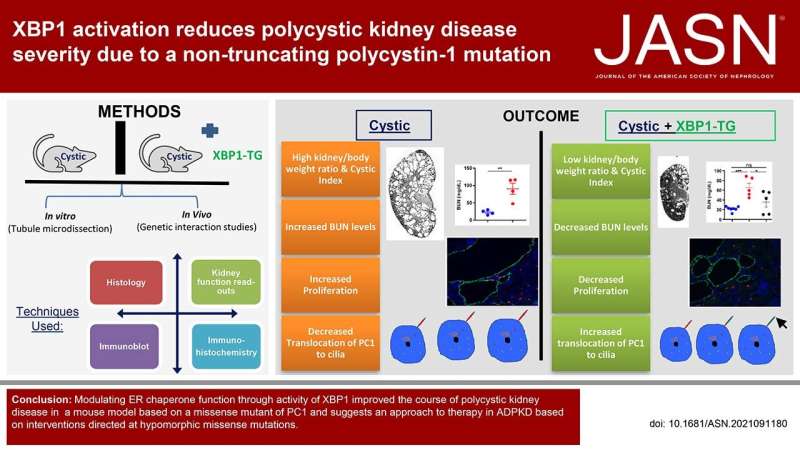Activation of the transcription factor XBP1 reduces severity of polycystic kidney disease

Most families with autosomal dominant polycystic kidney disease (ADPKD) possess a genetic mutation in PKD1 that impacts the protein polycystin-1 (PC1).
In a new article published online Friday, October 21, 2022, in the Journal of the American Society of Nephrology, a Yale team led by Stefan Somlo, MD and Sorin Fedeles, Ph.D., MBA demonstrated that the activation of the transcription factor XBP1 in vivo can improve the residual function of a mutant form of PC1, thereby decreasing the severity of ADPKD.
Genetic mutations can lead to a spectrum of PC1 function—from a complete loss of function to reduced levels. The Yale team focused on a human pathogenic missense PC1 mutation that leads to decreased levels, cleavage, and normal trafficking of the protein. They introduced this mutation in a preclinical model, which led to early-onset cystic disease. When the same model had the transcription factor XBP1 turned on, the levels, cleavage, and ciliary trafficking of PC1 was improved; leading to slower cyst growth and enhanced kidney function. Importantly, XBP1 had no impact on cystic disease when PC1 was completely absent.
"This is interesting because you don't need to have a huge impact on the in vivo functional levels of polycystin-1 to see a significant effect on disease severity," said Fedeles, assistant professor adjunct (nephrology) at Yale School of Medicine (YSM) and co-senior author of the paper.
The study is the first to show that promoting ER protein homeostasis in vivo via XBP1 can mitigate the effects of PKD due to mutations affecting PC1. Furthermore, the PC1 missense model generated as part of this effort may represent a valuable tool for investigators to examine the impact of other therapies on disease progression.
"Our findings here support the notion that personalized, mutation specific approaches to ADPKD may be a viable therapeutic avenue under certain scenarios," Fedeles said.
More information: Matteus Krappitz et al, XBP1 Activation Reduces Severity of Polycystic Kidney Disease due to a Nontruncating Polycystin-1 Mutation in Mice, Journal of the American Society of Nephrology (2022). DOI: 10.1681/ASN.2021091180. jasn.asnjournals.org/content/e … .2021091180.abstract




















